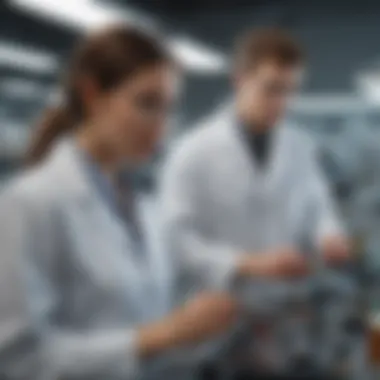Entry-Level Lab Jobs: Your Guide to Getting Started


Intro
Entering the laboratory field can be valuable for many individuals. The possibility of working in a lab, especially for those with limited experience, often feels daunting. However, there are pathways that allow one to navigate this landscape effectively. Understanding how to find local opportunities, what qualifications are necessary, and how to improve application materials can significantly enhance the chances of landing a job. This guide focuses on the essential aspects of breaking into entry-level lab positions without prior experience.
Key Concepts and Terminology
Definition of Terms
In the context of laboratory roles, several key terms arise frequently:
- Laboratory Technician: This is typically an entry-level role responsible for conducting experiments and analyzing results under the supervision of a scientist.
- Internship: A temporary position that offers practical experience in a laboratory setting, often targeted at students or recent graduates.
- Volunteer Work: Unpaid positions that still provide valuable experience, often in non-profit organizations, research facilities, or educational institutions.
These definitions serve as a foundation for understanding more complex job descriptions and qualifications.
Overview of Relevant Practices
Common practices to secure an entry-level lab job include:
- Networking with professionals in the field to uncover hidden job opportunities.
- Participating in local job fairs, which often have connections to nearby labs seeking employees.
- Utilizing online job search platforms, tailored for science and technology roles, to explore listings specifically aimed at entry-level candidates.
Current Trends and Innovations
Latest Research and Developments
In recent years, there has been a noticeable trend towards increased diversity in the workforce. Companies aim to have varied perspectives in their laboratories, which can lead to more innovative results. This shift invites individuals from various backgrounds, even those without direct lab experience, to consider applying.
Emerging Technologies and Tools
Technology continues to evolve, impacting laboratory jobs. The rise of automated processes and data analysis tools means that having basic computer skills can enhance your application. Familiarity with tools such as Microsoft Excel or data entry software can be beneficial.
Practical Applications
Step-by-Step Guides
- Identify Opportunities: Start by checking local universities, research centers, or hospitals for entry-level positions. Websites like Reddit often have job boards where such openings are listed.
- Build Your Resume: Focus on transferable skills. Highlight any relevant coursework, internships, or volunteer roles that show your interest and commitment to the field of science.
- Prepare for Interviews: Research common lab interview questions. Be ready to discuss your motivation and understanding of laboratory work, even if you lack experience.
Troubleshooting Common Issues
- Lack of Experience: If a job listing emphasizes experience, consider applying anyway. Many employers are willing to train motivated individuals who show potential.
- Skill Gaps: If you feel you lack certain skills, search for online courses or local workshops. Resources like Wikipedia can provide links to courses and communities for beginners.
By emphasizing technical skills and a willingness to learn, candidates can create a persuasive narrative, one that makes them stand out in a competitive job market.
Preface to Entry-Level Lab Jobs
Entering the field of laboratory work can be a daunting journey, especially for those without direct experience. This article aims to illuminate the pathways available for individuals looking to secure entry-level lab positions. Understanding the groundwork of lab jobs is crucial. It allows job seekers to see opportunities they might not have considered and highlights the necessary steps to prepare for applying in their local area.
Definition of Entry-Level Lab Positions
Entry-level lab positions typically refer to roles that do not require extensive prior experience or specialized education. These positions may include laboratory technicians, lab assistants, or other support roles. The focus is on helping seasoned professionals in various tasks such as sample preparation, equipment maintenance, and data collection.
Job seekers in this category usually have foundational knowledge, often gained from coursework in fields such as biology, chemistry, or environmental science. These roles serve as the initial point for many who aspire to build a career in laboratory sciences.
Importance of Lab Work in Various Fields
Lab work plays a critical role across numerous industries. In agriculture, for example, lab technicians are essential for soil testing and plant health analysis. Understanding various microorganisms can vastly improve crop yields. Likewise, in healthcare, lab workers help analyze blood samples and other clinical tests, directly impacting patient diagnoses.
Furthermore, research and development sectors rely heavily on laboratory personnel to drive innovation and solutions. This foundational work supports advancements in technology and health, making lab positions integral in addressing real-world challenges.
"Entry-level lab roles are not just jobs; they are stepping stones to career growth and advancement in diverse fields."
In essence, grasping the significance of these roles provides motivation for aspiring professionals. It emphasizes that even without prior experience, one can contribute meaningfully while developing necessary skills and knowledge.
Identifying Local Opportunities
Identifying local opportunities is crucial for individuals seeking entry-level lab positions, especially those without prior experience. Proximity plays a significant role in job search success. The ease of commuting can greatly influence not just the application process, but also the potential for interviews and networking. Moreover, local opportunities allow individuals to gain experience in their own communities, making it easier to balance work with other responsibilities.
When searching for nearby positions, individuals must consider various factors like the type of lab setting, local industry demands, and personal qualifications. This proactive approach increases visibility to employers and may lead to potential job offers. The benefits of identifying local opportunities include not only convenience but also the chance for long-term career development within a familiar environment.
Online Job Platforms


LinkedIn serves as an essential resource for individuals looking for entry-level lab jobs. This platform connects job seekers directly with employers and industry professionals. A unique characteristic of LinkedIn is its ability to showcase one’s professional profile, including skills, education, and recommendations from peers. This feature gives potential employers insights into an applicant's background, which can be advantageous for individuals without direct lab experience.
However, the competition on LinkedIn can be fierce. Many candidates actively apply for the same positions. Therefore, maintaining an updated profile is crucial to stand out.
Indeed
Indeed is another prominent online platform that offers a variety of job listings, including entry-level lab positions. One key aspect of Indeed is its comprehensive database of job opportunities across multiple sectors. It aggregates listings from various sources, making it easier for job seekers to find relevant positions in one place. Indeed also provides filters, enabling users to narrow their search according to location, salary, and job type.
Despite its strengths, users should be aware that the abundance of listings can sometimes lead to overwhelming choices. This requires candidates to be strategic about how they apply.
Glassdoor
Glassdoor provides job seekers with access to company reviews, salary information, and detailed job listings. It is especially beneficial for understanding workplace culture and the experiences of former employees. This feature can give candidates a glimpse into what to expect in potential lab environments, which is valuable for an informed decision.
However, Glassdoor's primary focus on company reviews may steer some candidates away from applying. They might feel discouraged if reviews reveal negative aspects of a workplace it’s important to acknowledge that all companies have strengths and weaknesses.
Networking in Professional Circles
Conferences
Conferences represent a significant opportunity for job seekers to connect with industry leaders and professionals. Attending relevant conferences allows individuals to engage in discussions about the latest trends in lab work, enhancing their knowledge and visibility. Engaging with speakers and other participants can lead to valuable contacts who may inform about job openings or provide mentorship.
However, conferences often require registration fees and travel costs, which may not be accessible for everyone. Still, the potential benefits make attending worthwhile for many.
Workshops
Workshops are beneficial for practical skill development and networking. Participating in hands-on activities allows candidates to enhance their technical skills, which can be particularly important for entry-level lab positions. Additionally, workshops often foster smaller group discussions, providing a more intimate setting for networking compared to larger conferences.
The downside may be the limited frequency and availability of workshops, which can make it challenging to find relevant events consistently. Still, the quality of connections formed in these settings can be substantial.
Seminars
Seminars typically focus on specific topics within the industry, providing valuable insights and learning experiences. They can be excellent venues for demonstrating knowledge and expressing interest in particular sectors of lab work. Engaging with speakers can help in establishing professional relationships that may benefit job searches.
However, the formal nature of seminars can sometimes make networking awkward for those not familiar with industry jargon or protocols. This may discourage some individuals from actively participating, but with preparation, they can maximize their experience.
Identifying local opportunities through online job platforms and networking can significantly augment one’s chances of securing an entry-level lab position. It requires a strategic approach, but the potential rewards are noteworthy.
Understanding Job Requirements
Understanding job requirements is crucial for those looking to secure entry-level lab positions. This section elaborates on the fundamental qualifications needed and how transferable skills from other fields can play a significant role in fitting into a lab environment. Knowing what is expected can save applicants time and help them better target their job searches.
Basic Qualifications for Entry-Level Lab Jobs
When applying for entry-level lab jobs, applicants often come across a set of basic qualifications that potential employers expect. These qualifications vary by field, but some common requirements include:
- Educational Background: Most lab positions require at least a high school diploma. Some roles may ask for an associate’s or bachelor’s degree in a relevant science field, such as biology or chemistry.
- Technical Aptitude: Familiarity with lab equipment is often necessary. Understanding basic laboratory techniques is also beneficial, even if the applicants learned them in a school setting.
- Safety Awareness: Many labs emphasize safety protocols. Awareness of proper handling and disposal methods for chemicals and biological materials can be a significant advantage.
- Attention to Detail: This trait is vital in laboratory work, where precision in procedures can directly affect outcomes.
Although specific qualifications may vary among employers, possessing a foundational understanding of these requirements will enhance an applicant's chances of being selected for an interview.
Transferable Skills from Other Fields
Applicants should consider their previous experience, even in different fields, as these experiences can provide valuable transferable skills. Common transferable skills include:
- Problem-Solving: The ability to approach problems logically and implement effective solutions is critical in any lab setting.
- Communication: Effective communication, both verbal and written, is essential for collaboration and reporting results.
- Teamwork: Many lab tasks require collaborative efforts. Experience working in teams can be a plus.
- Analytical Skills: The capacity to analyze data and draw conclusions is often essential in lab roles, regardless of prior work experience.
It is crucial to highlight these transferable skills in your applications. Employers often seek applicants who can adapt and learn quickly, especially in entry-level positions. By linking previous experiences to lab-related skills, candidates can strengthen their applications and demonstrate their potential value to prospective employers.
Preparation for Applications
When seeking entry-level lab jobs, effective preparation for applications is a crucial step. This process not only enhances your chances of securing an interview but also helps you understand how to present yourself in the best light possible. A well-prepared application can distinguish you from other candidates, even those with more experience. This section will focus on the essential elements of application preparation, highlighting the benefits and considerations that should not be overlooked.
Effective preparations allow you to clearly articulate your skills and aspirations. You will reflect on your background and identify how it aligns with the specific lab positions you wish to pursue. Additionally, it aids in creating a focused resume and cover letter that are tailored for each application. Personalization is vital, as it conveys genuine interest in the position and demonstrates that you have done your research about the company and its mission.
Considerations for preparation include recognizing the importance of time management. Align your schedule to allow ample time for crafting your documents and preparing for potential interviews. A rushed application often reflects in the quality of your materials, leading to missed opportunities.
Overall, preparation not only integrates technical qualifications but also illustrates how your personal traits make you a suitable candidate. This indicates to potential employers that you possess both the hard and soft skills needed in the lab environment.
Crafting a Compelling Resume
A resume is often your first point of contact with employers. When applying for entry-level lab jobs, your resume must convey relevant information concisely. Start with a clear format. Use headings, bullet points, and consistent fonts to present your details cleanly. Begin with your contact information at the top, followed by an objective statement if applicable. This should briefly express your career goals and intentions in seeking a lab position.
Next, categorize your experience appropriately. If you lack direct lab experience, highlight any related experience, such as coursework or projects related to science and technology. Include internships, volunteer work, and even relevant coursework that emphasizes your interest and knowledge in laboratory techniques. Quantifying your skills can enhance the visual impact of your resume. For example, "Conducted 20 hours of lab experiments in microbiology," offers precise details.


Finally, ensure to proofread your resume meticulously. Minor mistakes can detract from your professionalism and attention to detail, attributes that are crucial in laboratory settings.
Writing an Effective Cover Letter
The cover letter complements your resume and provides a narrative to your application. An effective cover letter should briefly explain your interest in the specific laboratory role and the organization. It is an opportunity to showcase your personality and passion for the field.
Begin with a professional greeting. Address the letter to a specific person whenever possible. In the opening paragraph, state the position you are applying for and how you found it. The body of the letter should elaborate on your skills and experiences relevant to the role. This is where you can connect the dots between your past experiences and the lab job requirements. Use specific examples to demonstrate your capabilities.
Conclude with a strong closing paragraph that reiterates your enthusiasm for the role. Thank the employer for considering your application and express your willingness to discuss your qualifications further in an interview.
A strong cover letter can demonstrate your commitment and differentiate you from other candidates.
In summary, crafting tailored application materials is a critical component of the job search process. Focus on presenting a clear, concise narrative that showcases your strengths and interest in entering the laboratory field.
The Role of Internships and Volunteer Work
Internships and volunteer work serve as pivotal components for aspirants inclined towards entry-level lab positions. These pathways often provide individuals with practical and insightful experiences that can greatly enhance one’s understanding of laboratory environments. Participating in internships or volunteer roles not only fosters skill development but also allows individuals to build networks within the scientific community.
Gaining Relevant Experience
Gaining relevant experience through internships is one of the most effective strategies for those entering the laboratory field. Internships offer structured training opportunities where individuals can learn essential laboratory techniques and best practices. They also help to bridge the gap between academic knowledge and practical application. By working in a real lab, individuals gain insights into daily operations and the demands of laboratory work.
Moreover, many employers view internships favorably. They demonstrate not only your commitment to the field but also showcase your ability to adapt to a professional environment. For people without prior experience, internships may serve as a critical stepping stone, giving you a competitive edge when applying for formal positions. The experience attained can highlight various transferable skills, such as teamwork, analytical thinking, and problem-solving.
Finding Volunteer Opportunities in Labs
Finding volunteer opportunities in labs can be an accessible alternative for gaining valuable experience. Many research institutions, universities, and nonprofit organizations often welcome volunteers to assist in various projects. Engaging in volunteer work can open doors to learning new techniques, expanding your practical skill set, and contributing to meaningful research.
To identify such opportunities, consider these strategies:
- Research Local Institutions: Check websites of local universities, research centers, or medical facilities that may have ongoing projects needing assistance.
- Networking: Attend local workshops or seminars to connect with professionals who may offer volunteer spots.
- Social Media: Joining relevant groups on platforms like Facebook or Reddit can reveal volunteer opportunities posted by others in the field.
Volunteering not only enriches your resume but also enhances your connections within the laboratory community, which can lead to potential job offers in the future.
By embracing internships and volunteer work, you position yourself advantageously in a competitive job market. These experiences impart crucial knowledge while expanding your professional network, ultimately bridging the gap between aspiring lab professionals and their desired careers.
Essential Skills for Lab Technicians
In the quest for entry-level laboratory jobs, possessing the right skill set can be crucial for standing out among the competition. For individuals with little to no experience, honing essential skills can bridge the gap and increase job prospects significantly. This section explores the vital technical abilities required and the soft skills that can propel candidates into successful lab careers.
Technical Skills Overview
Technical skills form the backbone of laboratory work. These abilities often include competency with lab equipment and knowledge of specific procedures. Understanding how to use tools like microscopes, pipettes, and centrifuges is essential for daily tasks. Moreover, familiarity with safety protocols in laboratory environments cannot be overstated. Any prospective lab technician must be able to follow standard operating procedures meticulously to ensure safety and accuracy.
In today's context, basic computer skills are also becoming increasingly necessary. Proficiency in data entry and data analysis software is important – commonly used software includes Microsoft Excel and statistical analysis programs. Additionally, candidates should be able to interpret technical data as well as maintain records of experiments and analyses.
Soft Skills and Personal Attributes
While technical skills are fundamental, soft skills are equally vital in cultivating a harmonious and effective laboratory environment. Communication skills rank high among these abilities. The capacity to convey results clearly and engage in discussions with team members enhances collaboration and fosters productivity. Moreover, critical thinking plays a crucial role in addressing unexpected challenges or anomalies during experiments.
Another significant personal attribute is attention to detail. In a lab setting, overlooking minor details can result in substantial errors, ultimately affecting the overall outcomes of research. Additionally, flexibility and adaptability are beneficial traits for navigating the dynamic nature of lab work. Laboratorians may need to shift priorities or adjust experiments based on evolving circumstances and findings.
The combination of both technical and soft skills truly shapes a capable lab technician, making them invaluable in advancing laboratory goals.
In summary, acquiring a blend of technical aptitude and interpersonal skills is vital for anyone seeking entry-level lab positions. Cultivating these competencies can dramatically enhance employment prospects and lay a strong foundation for future career growth.
Exploring Career Pathways
Understanding career pathways is crucial for individuals aspiring to enter the lab workforce. Entry-level positions are often the starting point for many professionals in laboratory settings. It is essential to grasp the opportunities available for advancement and specialization within these roles. This knowledge helps one to plan future goals effectively and align skill development accordingly.
Advancement Options from Entry-Level Positions
Starting in an entry-level lab job does not mean remaining in that role indefinitely. Many organizations value cultivating talent from within, leading to a range of advancement options based on performance and initiative.
A few key advancement opportunities include:
- Laboratory Technician: This position involves more responsibilities in the lab, such as conducting experiments and maintaining equipment.
- Senior Lab Technician: Individuals may take charge of projects and supervise entry-level staff, enhancing leadership skills.
- Quality Control Analyst: In this role, professionals ensure that lab processes meet established standards, often requiring specific training in regulations.
- Research Scientist: With additional education, one can transition into this role, focusing on innovative projects and experiments.
Each advancement option typically requires a blend of technical skills, personal drive, and sometimes additional certifications. Networking and mentorship are beneficial in pursuing these opportunities.
Specializations Within Laboratory Settings


As you grow in your career, exploring specializations can be a strategic move. Laboratories cover a diverse array of fields, each with its own unique focus. Here are some examples of potential specializations:
- Clinical Lab Technician: This specialization focuses on testing samples to help diagnose diseases.
- Environmental Lab Technician: Professionals might analyze soil, air, or water samples, contributing to environmental conservation.
- Quality Assurance/Quality Control (QA/QC): This role ensures products meet quality standards, crucial for pharmaceutical and food industries.
- Forensic Lab Technician: In this field, technicians analyze evidence collected from crime scenes, combining scientific rigor with investigative processes.
Choosing a specialization often depends on personal interests and market demand. Further education or training may be required to excel in certain domains.
Key takeaway: Advancing in laboratory careers requires continuous learning and openness to new opportunities. Specialists often enjoy fulfilling roles with a significant impact on society.
In summary, exploring career pathways within lab jobs provides individuals with options for growth and specialization. This strategic focus adds depth to one's career planning, ensuring a fulfilling professional journey.
Challenges in Securing Entry-Level Lab Jobs
Understanding the challenges in securing entry-level lab jobs is significant for job seekers. Recognizing these hurdles can help candidates tailor their approaches and strategies effectively. Since many aspiring professionals may lack experience, they need to navigate high competition and the industry's expectations. Addressing these challenges is not only about finding a job; it also involves positioning oneself for long-term success in the field.
High Competition Among Applicants
The job market for entry-level lab positions is notably competitive. A considerable number of applicants often vie for the same role. With the rise of new graduates entering the workforce, the influx of candidates can overwhelm employers. This heightened competition necessitates proactive strategies for those looking to secure a position.
- Diversifying applications can be beneficial. Instead of focusing solely on prestigious labs, candidates may consider smaller organizations or startups.
- Tailoring resumes and cover letters to highlight relevant skills or experiences can enhance an applicant's profile.
- Candidates should also leverage networking opportunities to make personal connections, which can sometimes lead to job openings not advertised publicly.
In such a crowded space, persistence and creativity in the application process become crucial. Candidates should not lose heart but adapt their strategies to stand out.
The Necessity of Experience
The demand for experience, even in entry-level positions, poses a significant barrier for many seeking lab jobs. Employers often prefer candidates who can demonstrate practical knowledge relevant to the role. This requirement can create a paradox for those just starting their careers.
- Many job descriptions list prior experience as a key criterion, which can discourage potential applicants.
- Candidates might explore internships or volunteer opportunities to bridge this gap. Although these options may be unpaid or low-paying, they provide practical exposure that enhances an applicant's marketability.
Moreover, emphasizing transferable skills from education or prior jobs can help applicants. Skills such as attention to detail, problem-solving abilities, and interpersonal skills are valuable in any lab setting.
"Demonstrating dedication, a willingness to learn, and pertinent skills can sometimes trump a lack of experience."
In summary, while the necessity of experience might seem daunting, strategic approaches such as gaining relevant exposure and effectively showcasing skills can help applicants overcome this challenge. Candidates need to remain steadfast in their efforts and focus on continuous personal growth.
The Impact of Technology on Lab Jobs
Technology fills an important role in modern laboratory environments. Its integration shifts how lab work is performed. Understanding this impact is crucial for those seeking entry-level lab jobs, especially when they lack prior experience. The right knowledge of technology can enhance job prospects and skill development.
Emerging Technologies in Laboratory Work
Laboratories increasingly adopt advanced technologies, changing methods of analysis and experimentation. For example, robotic systems are now frequently seen in automated laboratories. They increase efficiency and minimize human error. This adoption also lowers costs and speeds up research processes.
In addition, data analysis software is essential in modern labs. Programs like Python, R, or specialized tools help analyze vast data sets quickly. Familiarity with data management is a must for aspiring lab professionals.
Here are some emerging technologies shaping laboratory work:
- Artificial Intelligence (AI): Enhances decision-making processes in research.
- Lab-on-a-chip technology: Allows multiple tests to be conducted simultaneously using a single droplet of fluid.
- Biotechnology tools: Techniques like CRISPR are revolutionizing genetic research.
Understanding these technologies is not just beneficial; it is often a requirement in many positions. Job postings increasingly specify proficiency with certain tech tools.
The Importance of Technical Training
Technical training plays a vital role in preparing individuals for lab jobs. Training programs focus on essential skills, including operating specialized equipment and software usage. For someone without experience, this training can bridge the gap between theory and practical application.
Consider the following aspects regarding technical training:
- Skill Acquisition: Training hones specific skills needed for the job.
- Certification Programs: Completing relevant programs boosts credibility with potential employers.
- Hands-On Experience: Many programs provide lab access, allowing learners to practice in real settings.
"Technical training not only enhances knowledge but also builds confidence in performing lab tasks."
Ultimately, the integration of technology in labs will continue to grow. As new tools emerge, so too will the need for knowledgeable professionals. Embracing technology will set candidates apart in a crowded job market, fostering not only personal growth but also contributing to the evolution of laboratory work.
End
In this article, we have explored the landscape of entry-level laboratory jobs, focusing on how individuals with little to no experience can successfully navigate this sector. The importance of this discussion lies in providing a clear pathway for aspiring lab professionals. Many potential candidates face challenges due to the competitive nature of the field, but understanding the landscape can significantly enhance opportunities.
Recap of Key Points
To summarize the core elements discussed:
- Job Identification: Various online platforms like LinkedIn, Indeed, and Glassdoor are crucial for finding local opportunities. Networking at professional events is also beneficial.
- Understanding Qualifications: Basic qualifications often include relevant coursework or certifications. Transferable skills from non-lab environments can be valuable.
- Application Preparation: A well-crafted resume and cover letter that highlight your skills and motivation increase your chances of securing interviews.
- Internships & Volunteer Work: Engaging in internships or volunteer positions can provide hands-on experience and foster valuable connections in the field.
- Technical and Soft Skills: Familiarity with technical skills relevant to lab work, as well as soft skills such as communication and teamwork, are essential.
- The Impact of Technology: Staying informed about emerging technologies is vital in today’s lab environments.
Final Thoughts and Encouragement
Reflecting on the journey towards securing an entry-level lab position, it becomes clear that persistence and strategic planning are key. While the entry barrier may seem high, opportunities throughout internships, networking, and careful job searching can aid in overcoming these challenges.
By focusing on continuous learning and skills development, positions can be secured that not only fulfill immediate employment needs but also lay the groundwork for future career advancements. Remember, each step taken is progress toward goals within the lab profession. Keep striving, adapt to new information, and seize every opportunity.
Navigating the job market without experience is challenging, but strategic efforts can lead to rewarding career paths in laboratory settings.







